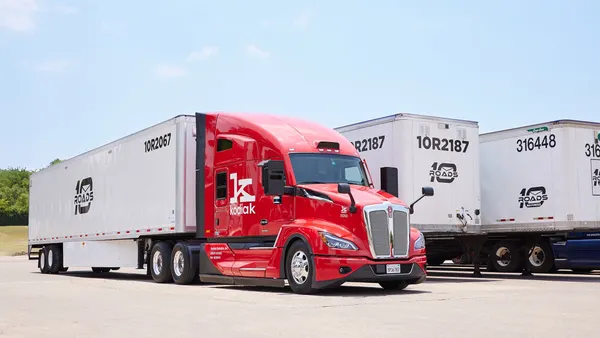UPDATE: Jan. 13, 2020: U.S. District Judge Roger Benitez extended the temporary restraining order that blocks Assembly Bill 5 (AB5) from being enforced for the trucking industry and it will remain in place until a ruling on the injunction, which could take days or weeks, a spokesperson for the California Trucking Association (CTA) said in an email. Benitez heard arguments from both sides on Monday but did not reach a final decision.
The CTA filed paperwork in the case last week saying a recent state court-level ruling supports its case, arguing federal law preempts Assembly Bill 5. The CTA is suing the state of California and The International Brotherhood of Teamsters in an attempt to exempt trucking from the law.
Dive Brief:
- A federal judge temporarily blocked Assembly Bill 5 (AB5) enforcement for the trucking industry by granting a restraining order in a case filed by the California Trucking Association (CTA) Tuesday.
- In the case, the lawyers for the CTA argued AB5 is preempted by the Federal Aviation Administration Authorization Act (FAAAA) of 1994 and they'd be at risk of government enforcement actions if the law took effect. This led U.S. District Judge Roger Benitez to grant the restraining order, writing the state is "temporarily enjoined from enforcing [AB5] as to any motor carrier operating in California, pending this Court’s resolution of Plaintiffs’ motion for a preliminary injunction."
- Benitez released his decision Dec. 31, the day before AB5 was set to take effect. The restraining order will be in effect until the court decides on the preliminary injunction case. A hearing is set for Jan. 13.
Dive Insight:
Stakeholders in the trucking industry expressed significant confusion in interviews with Supply Chain Dive in the weeks leading up to the court decision, saying they had received little guidance on how to comply with AB5.
AB5 author Assemblywoman Lorena Gonzalez, D-San Diego, said in a statement provided to multiple media outlets that the legislation is meant to fight misclassification in the trucking industry that has taken advantage of labor, stripping drivers of their deserved pay and rest periods.
"We expect [trucking companies] will continue to invest resources in protecting their profits earned on the backs of workers, but we will continue to fight them at all levels to return jobs in the trucking industry to good, middle-class careers," Gonzalez wrote.
Plenty of lawsuits point to the kind of environment Gonzalez referenced. XPO, FedEx, Knight-Swift and other large national carriers have been involved in cases wherein they were accused of classifying a worker as a contractor rather than an employee and thus avoiding obligations like paying the minimum wage, overtime and providing meal breaks.
Still, many independent owner-operators have spoken out in the wake of AB5's passage to say they have no desire to work for a carrier full time, but rather want to maintain the status quo that allows them to work for multiple carriers and create their own schedules. Some protested the legislation in recent weeks, asking for an exemption.
"This law is bad because we're going to be forced to be employees when we can grow as a small business," Eduardo Rangel, a truck owner-operator, told KPIX.














